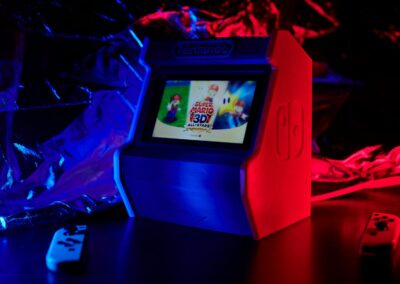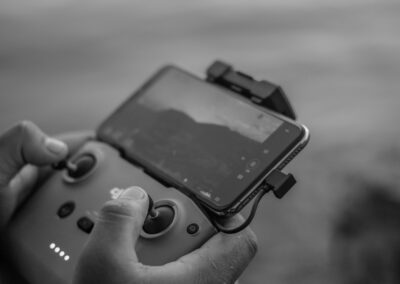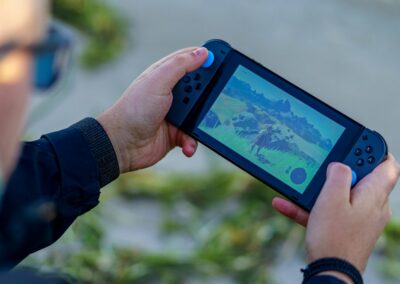Educational Games and Simulations for History and Social Studies: Innovations in UAE and Saudi Arabia
Revolutionizing History Education through Immersive Learning
The potential impacts of using educational games and simulations to teach subjects such as history and social studies are profound. These innovative tools offer immersive and engaging learning experiences that can transform how students understand and retain complex historical and social concepts. In the UAE and Saudi Arabia, where educational excellence and technological innovation are prioritized, integrating these tools into the curriculum can significantly enhance the quality of education.
Educational games and simulations provide interactive environments where students can explore historical events, cultural practices, and social dynamics. For instance, a simulation game might allow students to experience life in ancient civilizations, make decisions as historical figures, or explore the causes and effects of major historical events. This hands-on approach helps students develop a deeper understanding of historical content by engaging them in active learning.
Moreover, these tools can cater to different learning styles and preferences, making history and social studies more accessible and enjoyable for all students. Visual learners can benefit from rich graphics and animations, while kinesthetic learners can engage with interactive elements. In Dubai and Riyadh, where diverse student populations require varied instructional approaches, educational games and simulations offer a versatile solution to meet these needs.
The use of AI in these tools further enhances their educational value. AI can personalize learning experiences by adapting the content to the individual student’s pace and level of understanding. For example, an AI-powered game could provide additional context or hints when a student struggles with a particular concept, ensuring that they receive the support they need to succeed. This personalized approach not only improves student engagement but also fosters a deeper understanding of historical and social studies content.
Engaging Students in Social Studies through Simulations
Social studies education benefits significantly from the integration of educational games and simulations. These tools make abstract social concepts more tangible by allowing students to explore them in a controlled, interactive environment. For example, a simulation game might allow students to participate in a virtual model of the United Nations, where they can learn about diplomacy, international relations, and global issues firsthand.
In the UAE and Saudi Arabia, where understanding social dynamics and cultural diversity is crucial, such simulations can provide valuable learning experiences. Students can explore different cultural perspectives, understand the complexities of global interdependence, and develop critical thinking skills by analyzing various social scenarios. This experiential learning approach helps students connect theoretical knowledge with real-world applications, making social studies more relevant and engaging.
Furthermore, these tools can foster collaboration and teamwork among students. Many educational games and simulations are designed for group participation, encouraging students to work together to solve problems and make decisions. This collaborative learning environment helps students develop essential social skills such as communication, cooperation, and conflict resolution. In Dubai and Riyadh, where fostering a collaborative and innovative mindset is key to future success, integrating these tools into social studies education can have a lasting impact.
The role of executive coaching services can also be pivotal in the successful implementation of these educational technologies. Coaches can work with educators to develop effective strategies for integrating games and simulations into their teaching practices, ensuring that these tools are used to their full potential. By providing guidance and support, executive coaches can help educators overcome any challenges they may face and enhance the overall effectiveness of the educational experience.
Addressing Challenges in Implementing Educational Games and Simulations
While the benefits of educational games and simulations are clear, implementing these tools in educational settings comes with its own set of challenges. To ensure successful outcomes, it is essential to address these challenges effectively.
One major challenge is the technical complexity involved in developing and maintaining high-quality educational games and simulations. Creating engaging and educationally sound games requires collaboration between game developers, educators, and subject matter experts. This process can be time-consuming and costly, posing a barrier for institutions with limited resources. To overcome this, educational institutions in Dubai and Riyadh can seek partnerships with technology companies and leverage government funding initiatives aimed at promoting educational innovation.
Another challenge is ensuring that the content within the games and simulations aligns with curriculum standards and learning objectives. Educational tools must balance entertainment with educational value, ensuring that gameplay mechanics reinforce the desired learning outcomes. Close collaboration between game designers and educators is crucial to create content that is both engaging and pedagogically sound. In regions like the UAE and Saudi Arabia, where educational excellence is a priority, this alignment is vital for the successful adoption of game-based learning.
Training educators to effectively use and integrate these tools into their teaching practices is also essential. Many educators may lack the necessary skills and confidence to implement game-based learning strategies, leading to resistance or ineffective use of the technology. Providing comprehensive professional development and support can help educators embrace and utilize these tools effectively. By investing in training programs and workshops, educational institutions in the UAE and Saudi Arabia can equip their teachers with the skills needed to harness the potential of educational games and simulations.
Leadership and Management in Educational Technology Implementation
Effective leadership and management are critical for the successful implementation of educational games and simulations. Business executives and mid-level managers in the UAE and Saudi Arabia need to be knowledgeable about the latest technological advancements and possess the skills to drive digital transformation within their organizations. This involves understanding the technical aspects of educational technologies and fostering a culture of innovation and agility.
Leadership in this context means being able to navigate the complexities of integrating educational games and simulations into existing educational systems and processes. Managers must be adept at project management, coordinating cross-functional teams, and managing resources effectively to implement these technologies successfully. This includes setting clear objectives, monitoring progress, and ensuring that the solutions deliver the intended benefits.
In Dubai and Riyadh, where the pursuit of technological innovation is a national priority, the ability to implement educational technologies effectively can provide a significant competitive advantage. By embracing these technologies, organizations can enhance their educational offerings, improve student outcomes, and drive business success. Strong leadership and management skills are crucial for navigating this transformation and achieving sustainable growth.
Project Management in Educational Technology Deployment
Effective project management is essential for the successful deployment of educational games and simulations. Given the complexity and scale of these projects, a structured and methodical approach is required. This involves detailed planning, risk assessment, and stakeholder management to ensure that the project stays on track and meets its objectives.
In the context of the UAE and Saudi Arabia, where large-scale educational initiatives are common, project management skills are particularly valuable. Managers need to balance short-term deliverables with long-term strategic goals, ensuring that each phase of the project contributes to the overall vision. This requires a deep understanding of both the technical and educational aspects of educational technologies.
Furthermore, project management in the educational technology space often involves navigating regulatory landscapes and ensuring compliance with local and international standards. This adds an additional layer of complexity, requiring managers to stay updated on the latest regulatory developments and adapt their strategies accordingly. By doing so, they can ensure that their educational technology initiatives are not only innovative but also compliant and sustainable.
Conclusion: The Future of Education with Games and Simulations
The adoption of educational games and simulations for teaching history and social studies is set to revolutionize education, particularly in the UAE and Saudi Arabia. By leveraging the principles of AI and modern technology, these tools offer a secure and efficient way to enhance the learning experience for students. For business leaders and managers, embracing educational games and simulations presents an opportunity to enhance educational outcomes, improve operational efficiency, and achieve business success.
As the field of education continues to evolve, the role of educational games and simulations will become increasingly important. By staying at the forefront of technological advancements and fostering a culture of innovation, organizations in Dubai, Riyadh, and beyond can position themselves for sustained growth and success in the digital age.
—
#EducationalGames, #Simulations, #HistoryEducation, #SocialStudies, #AI, #UAE, #SaudiArabia, #Riyadh, #Dubai, #ModernTechnology, #BusinessSuccess, #LeadershipSkills, #ManagementSkills, #ProjectManagement























